HOW COMPLEX WAS THE SOCIAL IDENTITY OF JESUS CHRIST? AN INTERDISCIPLINARY STUDY
Abstract
This interdisciplinary study examines the social identity complexity (SIC) of Jesus Christ within the framework of Social Identity Complexity Theory (SICT) as developed by Roccas and Brewer (2002). Situated in a broader research agenda of mitigating ethno-religious violence in Northern Nigeria through high SIC, the paper explores how Jesus’ multiple and intersecting social identities—as represented in the New Testament—can serve as a model for promoting high social identity complexity, thereby fostering tolerance and peaceful co-existence between Christians and Muslims. Drawing on biblical, theological, and social scientific methodologies, the study argues that Jesus embodied a high level of social identity complexity, demonstrated through his (self-) identification across diverse roles (e.g., Son of God, Son of Man, Prophet), his teachings, and his relational dynamics within the Trinity. The study situates Jesus’ identity within the broader conceptual domains of Trinitarian theology, the God-Man Christological paradigm, and the Kingdom of God motif, presenting these as divine and human ingroup affiliations of Jesus, reflective of his overly complex identity negotiations. By highlighting the inclusive, integrative dimensions of Jesus’ social identity, the study proposes a model of high SIC that holds promise for contemporary interreligious peacebuilding, especially in the context of persistent Christian-Muslim conflict in Northern Nigeria.


